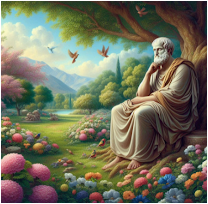In Western philosophy, few names loom larger than Aristotle regarding well-being. His ideas, formulated centuries ago, are still surprisingly relevant today. But what exactly did this ancient Greek thinker believe makes a good life?
Eudaimonia: More Than Just Happiness
For Aristotle, true well-being wasn't simply about feeling good or momentary pleasure. He used eudaimonia to describe a more profound concept: a complete life filled with virtuous ac
tivity. (Haybron 2013). Now, virtue in this context goes beyond just morality; it encompasses the full range of human excellence, including the obvious like courage and fairness, as well as more subtle qualities like with and grace, according to Habron (2013). In today's terms, excellence might be a better fit than virtue, but remember, we're talking about excellencies specific to humans, not bottle cap collecting (Haybron 2103).
Why Poverty Matters
In Aristotle's view, poverty significantly restricts your ability to exercise your human potential. Think about someone stuck working long hours just to survive. There must be more opportunities to develop their talents or live a rich, fulfilling life. For Aristotle, poverty hinders your ability to truly function as a human being.The Allure of Aristotle's View
Eudaimonia vs. Subjectivity
Haybron (2013) writes that this focus on fulfilling our nature defines a category of well-being theories called eudaimonic theories. These theories are gaining traction in psychology and are forming the foundation of eudaimonic psychology.
The Strengths of Aristotle's Approach
But is Aristotle Flawless?
- Objectivity vs. Subjectivity: Some thinkers reject the notion of objective facts about what's good for us. They believe well-being is subjective and depends on individual preferences.
- External Standards: Shouldn't well-being be about you, not your species? Consider Ferdinand the Bull, who preferred flowers to fight. This challenges the idea of a universal human good.
- Virtue and Happiness: Was Genghis Khan, a successful but brutal leader, pleased? This raises questions about the automatic link between virtue and well-being.
References
- Haybron, Daniel M., 'Beyond happiness: well-being,' Happiness: A Very Short Introduction, Very Short Introductions (Oxford, 2013; online edn, Oxford Academic, 24 Sept. 2013), https://doi-org.ezproxy.snhu.edu/10.1093/actrade/9780199590605.003.0006, accessed 26 June 2024.






No comments:
Post a Comment